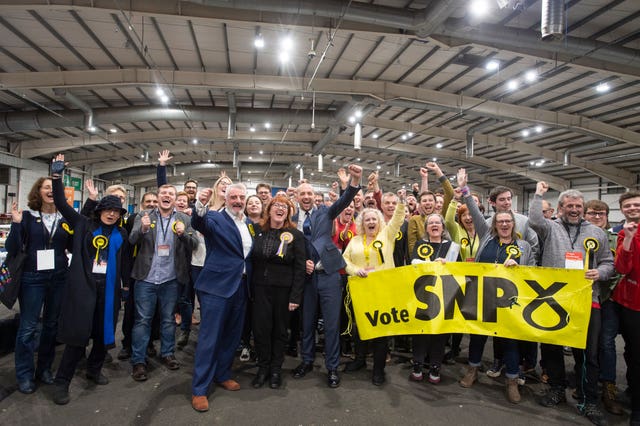Nicola Sturgeon has called on the PM to grant Holyrood the power to hold a second vote on Scottish independence.
The First Minister has formally written to Boris Johnson, calling for a Section 30 order to be granted.
It comes after Boris Johnson’s Conservatives swept to power with a large majority of 364 seats, while the SNP won 47 out of the total 59 seats in Scotland.
READ MORE: Nicola Sturgeon demands permanent referendum power for Holyrood
 SNP candidates and supporters celebrate at the end of election night at the Royal Highland Centre in Edinburgh (Lesley Martin/PA)
SNP candidates and supporters celebrate at the end of election night at the Royal Highland Centre in Edinburgh (Lesley Martin/PA)
As she confirmed the move, Ms Sturgeon said: “The mandate we have to offer the Scottish people a choice over their future is, by any normal standard of democracy, unarguable.
“We are therefore today calling for the UK Government to negotiate and agree the transfer of power that would put beyond doubt the Scottish Parliament’s right to legislate for a referendum on independence.”
READ MORE: Section 30: What is it, how does it work and can Scotland hold another referendum without it?
Powers to hold a referendum are currently reserved to Westminster, therefore a Section 30 order is required if an independence ballot is to be held in Scotland.
If granted, powers are temporarily transferred from Westminster to the Scottish Parliament in Edinburgh, allowing a referendum to be held.
The order is set out under the Scotland Act 1998, which just over two decades ago allowed for a Scottish Government of ministers and a Scottish Parliament to first come into force.
In October 2012, a request for a Section 30 order was granted after a deal was reached between then-first minister of Scotland Alex Salmond and the prime minister at the time, David Cameron.
That came after the SNP won an unprecedented overall majority in the Scottish Parliament in 2011 and it paved the way for the holding of a Scottish independence referendum in 2014.
 The Edinburgh Agreement was signed by Alex Salmond (left) and David Cameron (Gordon Terris/The Herald/PA)
The Edinburgh Agreement was signed by Alex Salmond (left) and David Cameron (Gordon Terris/The Herald/PA)
Months of talks between the Scottish and UK Governments resulted in the Edinburgh Agreement – the deal that allowed the historic ballot to take place.
Another Section 30 request was made by Ms Sturgeon in her role as First Minister in 2017 but it was rejected by Theresa May, who said that it was “not the time” for another referendum.
In the run-up to the December general election, Ms Sturgeon made it clear she would request a Section 30 order by the end of 2019, with the First Minister already having outlined plans to hold a second vote on Scottish independence in the latter part of next year.



Why are you making commenting on The Herald only available to subscribers?
It should have been a safe space for informed debate, somewhere for readers to discuss issues around the biggest stories of the day, but all too often the below the line comments on most websites have become bogged down by off-topic discussions and abuse.
heraldscotland.com is tackling this problem by allowing only subscribers to comment.
We are doing this to improve the experience for our loyal readers and we believe it will reduce the ability of trolls and troublemakers, who occasionally find their way onto our site, to abuse our journalists and readers. We also hope it will help the comments section fulfil its promise as a part of Scotland's conversation with itself.
We are lucky at The Herald. We are read by an informed, educated readership who can add their knowledge and insights to our stories.
That is invaluable.
We are making the subscriber-only change to support our valued readers, who tell us they don't want the site cluttered up with irrelevant comments, untruths and abuse.
In the past, the journalist’s job was to collect and distribute information to the audience. Technology means that readers can shape a discussion. We look forward to hearing from you on heraldscotland.com
Comments & Moderation
Readers’ comments: You are personally liable for the content of any comments you upload to this website, so please act responsibly. We do not pre-moderate or monitor readers’ comments appearing on our websites, but we do post-moderate in response to complaints we receive or otherwise when a potential problem comes to our attention. You can make a complaint by using the ‘report this post’ link . We may then apply our discretion under the user terms to amend or delete comments.
Post moderation is undertaken full-time 9am-6pm on weekdays, and on a part-time basis outwith those hours.
Read the rules hereLast Updated:
Report this comment Cancel